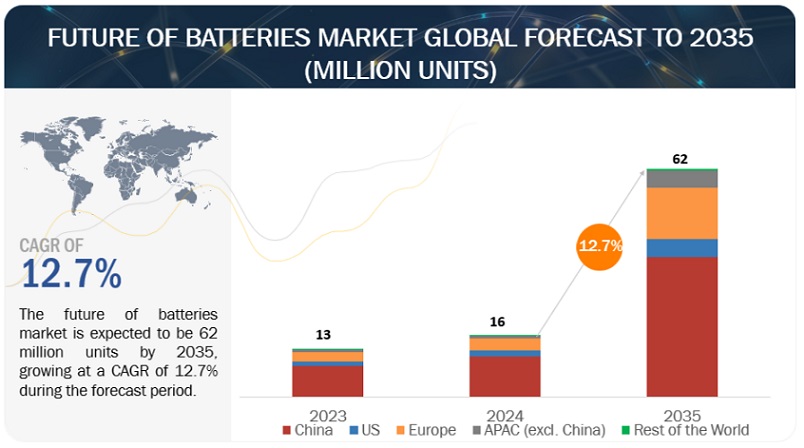The global future of batteries market is projected to grow from 16 million units in 2024 to 62 million units by 2035, at a CAGR of 12.7%.
Higher standard batteries have been introduced due to recent developments in the EV market. Even though new batteries should increase EV performance and range, consumers are still hesitant to pick EVs over internal combustion engine (ICE) vehicles due to a number of issues, including EVs’ short range, lengthy charging times, high cost, and scarcity of charging stations. Consequently, EV battery manufacturers are focusing on creating new batteries with innovative, quick, and rapid charging technologies to overcome these challenges. In addition, advances in manufacturing processes such as automation and creative assembly methods are being made to lower expenses and improve battery production’s scalability. This includes advancements in pack integration, cell assembly, and electrode fabrication. These developments are anticipated to have a lucrative impact on market expansion.
Cylindrical segment is expected to grow at the fastest rate during the forecast period
The cylindrical segment is projected to register the highest CAGR during the forecast period. Durable and long-lasting are two characteristics of cylindrical batteries. Due to their excellent confinement and effective mechanical resistance against internal and external pressures, cylindrical cells are the least expensive to manufacture compared to alternative EV battery types. Manufacturers are starting to use cylindrical batteries as well. Tesla, for instance, uses cylindrical batteries due to their dependability and robustness. The new generation of cylindrical batteries, like the 4680 format pioneered by Tesla, boasts significant improvements in range and efficiency compared to older models.
Download PDF Brochure @ https://www.marketsandmarkets.com/pdfdownloadNew.asp?id=243513539
Solid state battery expected to be the next big shift during forecast period
Emerging solid-state battery technology has various potential benefits for electric vehicles. Unlike traditional lithium-ion batteries, which utilize liquid electrolytes, they use solid electrolytes. Because solid electrolytes are less likely to experience problems like leaking, overheating, and fire hazards, they are considered safer overall for electric vehicles. Faster charging times could be possible using solid-state batteries as opposed to lithium-ion batteries. Because of their enhanced conductivity and capacity to tolerate higher charging rates, EVs may require fewer charging cycles, saving users time and increasing convenience. For instance, In October 2023, Toyota secured a deal to mass-produce solid-state EV batteries with a 932-mile range. Using materials developed by Idemitsu Kosan will allow Toyota to commercialize these energy-dense batteries by 2028. Solid-state batteries can significantly extend a vehicle’s driving range as well. It is projected that a solid-state battery replacement may quadruple the driving range of the Tesla Roadster. Such benefits will help the solid-state battery market grow over the projected period.
North America to be the prominent growing market for EV batteries during the forecast period
The automotive sector in North America is one of the most developed worldwide. Major commercial automakers like Tesla, Proterra, MAN, and NFI Group are based in the region, which makes it well-known for its cutting-edge EV R&D, inventions, and technological advancements. These businesses are investing in constructing and expanding battery production plants in North America. To meet the growing demand for electric vehicles, these facilities produce sophisticated battery technology, including lithium-ion batteries. The US has historically led the way in technology in North America. Leading EV battery suppliers and startups have partnered with OEMs in the North American EV market. For example, GM and LG Chem have partnered.
On the other hand, Stellantis and Samsung SDI are working together to develop EV batteries. Additionally, Ford and SK Innovation are working together. Tesla produces its own EV battery products. These companies are working together to set up production facilities in the United States. Additionally, a number of state and federal laws and programs are promoting the use of EVs and the growth of the EV battery industry. This covers tax breaks for buying electric vehicles, capital expenditures for infrastructure related to charging, and battery research and development financing. In addition, OEMs are focusing more on introducing electric buses, vans, and trucks; this will likely result in a significant growth in the North American EV battery business. Another factor expected to propel expansion in the North American EV battery is the growing need for fleets of zero-emission freight and public transit vehicles.
Key Players
The major players in Future of Batteries market include CATL (China), BYD Company Ltd. (China), LG Energy Solution Ltd. (South Korea), Panasonic Holdings Corporation (Japan), and SK Innovation Co., Ltd. (South Korea). These companies adopted various strategies, such as new product developments and deals, to gain traction in the market.
Request Free Sample Report @ https://www.marketsandmarkets.com/requestsampleNew.asp?id=243513539
Media Contact
Company Name: MarketsandMarkets™ Research Private Ltd.
Contact Person: Mr. Aashish Mehra
Email: Send Email
Phone: 18886006441
Address:630 Dundee Road Suite 430
City: Northbrook
State: IL 60062
Country: United States
Website: https://www.marketsandmarkets.com/Market-Reports/future-of-batteries-market-243513539.html

